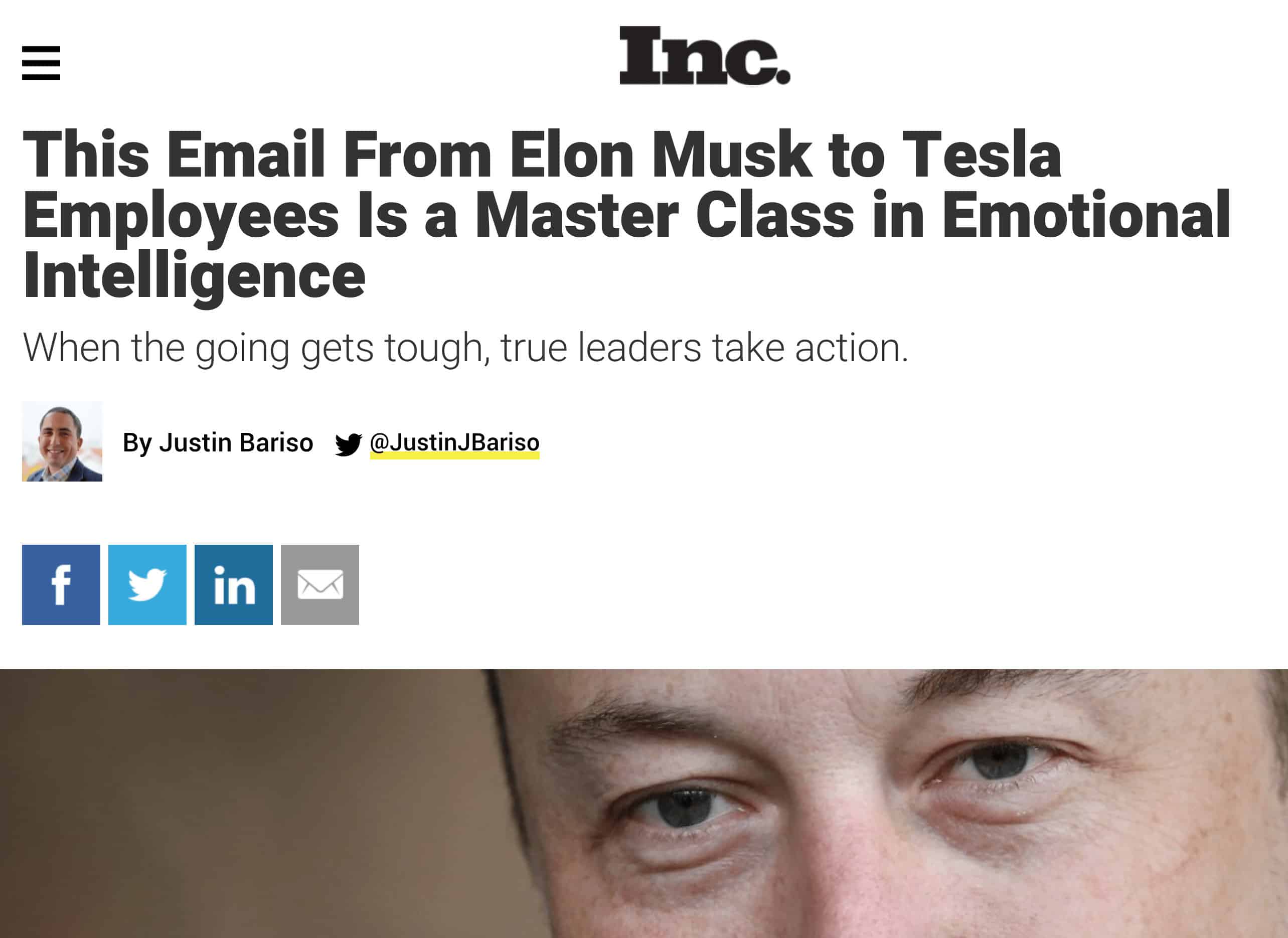There's a lot to admire about Elon Musk. I admire his risk taking and his entrepreneurial spirit. I use PayPal a lot (one of his early companies) and I admire the innovation of Tesla and SpaceX. But, I question how much Musk and Tesla have been willing to learn from Toyota.
I saw this article last year and never got around to blogging about it:
“This Email From Elon Musk to Tesla Employees Is a Master Class in Emotional Intelligence“

I think the article was giving him a bit too much credit.
Tesla was catching flak for employee injury rates that were higher than auto industry averages. Some reports say serious injury rates were twice as bad as the industry.
Last year, Musk said the company is “on its way” to lowering injury rates. This year, Tesla set forth a plan to become the “safest auto factory in the world.” Their data suggests the injury rate is lower than the days when the NUMMI plant was active in that same building.
Hear Mark read this post — subscribe to Lean Blog Audio
“In October, Tesla hired Laurie Shelby from Alcoa to oversee all aspect of environment, health and safety throughout the automaker's workforce.”
“From Alcoa” is a very good sign. More about that later in the post.
But back to the Inc. article — Is it really the height of “emotional intelligence” to tell your employees that you don't want them to get hurt? Musk wrote, in an email to employees:
Part of that says:
“No words can express how much I care about your safety and wellbeing. It breaks my heart when someone is injured building cars and trying their best to make Tesla successful.”
It's one thing to feel bad. What about the action that's praised in the Inc. piece?
Musk also wrote:
“Going forward, I've asked that every injury be reported directly to me, without exception. I'm meeting with the safety team every week and would like to meet every injured person as soon as they are well, so that I can understand from them exactly what we need to do to make it better.”
It's good to understand “what we need to do to make it better.”
But is it good enough to react to an injury after the fact? What about preventing injuries?
Alcoa and Former CEO Paul O'Neill
It's one thing to ask that “every injury be reported directly” to Musk. I think former Alcoa CEO Paul O'Neill set the standard for CEOs directly supporting safety improvement (listen to my podcast with him).
O'Neill set a goal for Alcoa to become “the safest company in America” (not just the safest in the metals industry). His goal was ZERO injuries (as you can read about here). O'Neill frames this as a moral imperative, that nobody should be hurt at work.
O'Neill uses the term “habitual excellence” to describe the culture shift that takes place in an organization. If you do the things that are required to have great safety performance, you'll do well in your other measures. Alcoa's stock performed very well under O'Neill's leadership and I've heard him say that Wall Street analysts thought he was crazy for talking about safety and for making it such a priority.
This article describes a story that I've heard O'Neill tell in a speech:
O'Neill told management: “As soon as anyone in this organization identifies a condition that could cause anyone here to be hurt, I want you to fix it.
Note that O'Neill wasn't saying he would react to INJURIES. He was encouraging everybody to react to UNSAFE CONDITIONS that could lead to an injury. Responding to unsafe conditions is far more proactive. That's a better way of preventing injuries. I wish Musk would take that same approach.
“And you should know from now on that we're not going to budget for safety at Alcoa. As soon as we identify a risk condition, it will be fixed, and I will figure out how to pay for it.”
Then O'Neill gave his home phone number to the hourly workers on hand, instructing them to call him if they saw any hazardous conditions that haven't been addressed.
O'Neill set the expectation that budget would never be an excuse. Giving out his home phone number sent a very strong message to employees and managers. I guess the modern-day version would be Musk asking his employees to email him or DM him via Twitter?
A few weeks later, O'Neill received a phone call late at night. It was an hourly representative from the Tennessee plant, who told O'Neill that a section of the plant's roller conveyor system was broken. The caller said that he and other hourly workers had to carry 600-pound ingots where the conveyor was broken, and the workers were “‘terrified‘” that they were going to get hurt.
After he hung up with the worker, O'Neill called the plant manager and instructed him to fix the conveyor. Around 4 a.m., the plant manager called O'Neill to tell him that it had been repaired.
At that point, word spread throughout the company that O'Neill was serious about safety.”
Maybe hiring the safety leader from Alcoa will help at Tesla.
Disclosure: I work as a subcontractor to the healthcare consulting firm Value Capture, LLC, where O'Neill is non-executive chairman.
Where Musk Did NOT Show E.I. or Respect
Back to Musk's email, he said that after an injury:
“I will then go down to the production line and perform the same task that they perform.”
This is where I think Musk's email does NOT show much emotional intelligence or savvy. His statement seems disrespectful and I'm not sure all of his employees would have reacted to it positively.
What is the point of saying, “I'll come and do that job if you got hurt”??
Is Musk saying, “I'm willing to jeopardize my own health and safety?” If so, do shareholders really want to hear that message?
Is Musk saying, “I can come do your job?” If so, he doesn't seem to show much respect for the training and practice that goes into doing a job, even a repetitive assembly job.
When I was an industrial engineer at General Motors in 1995, I had the chance to work the engine assembly line for an hour (with the UAW worker looking over my shoulder and supervising). I'm pretty clumsy. Running bolts into an engine wasn't a good job for me (and I really hope it didn't cause problems for our customers). Auto production work isn't easy. Musk's message seems dismissive of the skill and dexterity required. Can anybody just waltz in and do any job? Was Musk going to get trained and certified on a job?
Is Musk saying, “I'll do the job and prove that it's not unsafe… I'll do it and I won't get hurt”? What does it prove to work a job for an hour? What if the employee injury on that job was caused by ergonomic problems that accumulated over time? What if the injury occurred at the end of a long production shift with overtime at the end of a busy week? Musk can't simulate or replicate that by jumping in and doing a job for a short period of time.
Has He Followed Through?
I wonder if Musk has followed through on the commitments he made in that email?
- Does he get notified of every injury?
- Has he gone and done the job, whatever that means exactly?
I've searched online and cannot find any news stories about this. I'm guessing if he DID respond to an injury by doing the job that he'd get some P.R. exposure from it.
He has been busy promoting and getting exposure from future product announcements, selling “flamethrowers” through his Boring Company, and many SpaceX events. Musk doesn't shy away from media coverage… it would be good to see him get more media attention for safety improvements at Tesla.
For what it's worth, I tried asking this question of Musk on Twitter:
You can ask him if you like:
Hey @ElonMusk, have you followed through on your commitments to talk to injured employees & do their job @Tesla? http://bit.ly/2o2qjsd Share on XI'll update this post if there's a response. I also reached out to the new EHS leader via LinkedIn, but haven't heard back from the company.
Please scroll down (or click) to post a comment. Connect with me on LinkedIn.
Let’s work together to build a culture of continuous improvement and psychological safety. If you're a leader looking to create lasting change—not just projects—I help organizations:
- Engage people at all levels in sustainable improvement
- Shift from fear of mistakes to learning from them
- Apply Lean thinking in practical, people-centered ways
Interested in coaching or a keynote talk? Let’s start a conversation.








![What’s Your Organization’s Real Mistake Policy? [Poll]](https://www.leanblog.org/wp-content/uploads/2025/07/Lean-Blog-Post-Cover-Image-2025-07-17T085114.134-100x75.jpg)

Comment from LinkedIn:
Phil Weihl:
Zero injuries is the ONLY goal. Proactive elimination of unsafe conditions with full engagement by the entire leadership team helps drive that. Being ‘better than average’ is not something to crow about when it comes to safety. 100% Safe is the goal.
Hi Mark, I think it is a bit harsh on Elon Musk when he says “I will then go down to the production line and perform the same task that they perform.”
I wouldn’t read that as saying he will do the job because it is easy or to prove it is not safe. I would read it more as great leadership, going to the Gemba, and truly understanding what the worker’s job involves so that you can then understand what needs to be done to improve it.
I am very interested in the Tesla story. I’m admire Musk’s innovation and ambition but agree that I’m not sure they are learning from Toyota and other automakers and this could be to their detriment in the future.
Thanks for the comment, Eoghan. Maybe I am being a bit oversensitive or a bit harsh. But I think the epitome of “emotional intelligence” is having a good understanding of how works might be interpreted. I could see his “I’ll come do the job” comments offending some production team members, having worked in manufacturing environments as an engineer. It wouldn’t offend everybody, of course. Some of it depends on the relationships he has built with people (or not built).
Either way, Elon made this commitment to talk to injured workers and to do their jobs. Has he done that? A good leader follows through on their promises instead of getting distracted by new things.
I’m curious how coming down and performing the job once is going to contribute to resolving things like repetitive strain injuries that only manifest themselves after, well, repetition. It does give you some insight into the experience, but it could also be an excuse to dismiss the complain. All depends on your mindset going in. I’d rather have a professional ergonomist visit me than the CEO–of course, if he brings an ergonomist and they both do the job, that might be something…
How do you think Musk sleeping on a couch in the factory is going to help??
Another comment from LinkedIn:
Sonia K. Singh, MHA
Excellent post Mark Graban. I appreciate the questions you posed to challenge Elon Musk. His email at first glance seemed to be the right words to say. But as you said, they weren’t enough to truly show respect to the employees and to drive change. Being notified ‘after’ an injury isn’t as impactful as being notified of an unsafe condition, that could lead to an injury.
I relate this to HAIs (hospital acquired infections). As a leader you probably know each time a patient in your dept. gets an infection. But…are you notified when someone doesn’t wash their hands? Or, doesn’t use gloves? Or, doesn’t change their gloves after exposure to bodily fluids?
Thanks. You’re asking great questions in that second paragraph… that’s one reason I wrote this, to spark thinking about what leaders could or should be doing in healthcare.
I think you might be judging Musk too harshly. When he says that he wants to “meet every injured person as soon as they are well, so that I can understand from them exactly what we need to do to make it better,” I think that he has the same mindset as O’Neill. It’s true that he doesn’t specifically ask for notification of unsafe conditions, but I’m willing to give him the benefit of the doubt. As far as him saying that he’d do an employee’s job, I’m with Eoghan — I think he’s showing respect and willingness to go to the gemba. If there’s blame, it’s on Inc. for larding up the piece with vague business-speak like “emotional intelligence.”
See this article:
Tesla says its factory is safer—but it left injuries off the books
It’s absurd? Musk said he would meet with EVERY injured worker.
Many are injured weekly and after requesting the safety list are not on the reported lists either. That’s the law. If Elon meets with every injury he wouldn’t have time to do his job. Maybe we should follow up on how he made yellow vest and white hats black and made employees disconnect the beeping on moving equipment like. Scissor lifts and forklifts. Mandatory volunteer overtime .
I read about those accusations in this article:
Tesla says its factory is safer. But it left injuries off the books
Tesla screams “fake news” about this, basically, as they write about here:
A Not So Revealing Story
Is the truth somewhere between those two articles?
Reveal News shared claims about yellow not being liked by Elon. Tesla posted a few pictures that show the factory is not a yellow-free zone… but I notice that lane markings are white, when those are quite often yellow.
https://www.tesla.com/sites/default/files/images/blogs/tesla-yellow-3.jpg
https://www.tesla.com/sites/default/files/images/blogs/tesla-yellow-1.jpg
https://www.tesla.com/sites/default/files/images/blogs/tesla-yellow-2.jpg
A robot being painted yellow doesn’t prove much of anything.
https://www.tesla.com/sites/default/files/images/blogs/tesla-yellow-4.jpg
I’d wonder how often lock-out-tag-out procedures are followed? That’s more important than paint color.
https://www.tesla.com/sites/default/files/images/blogs/tesla-yellow-5.jpg